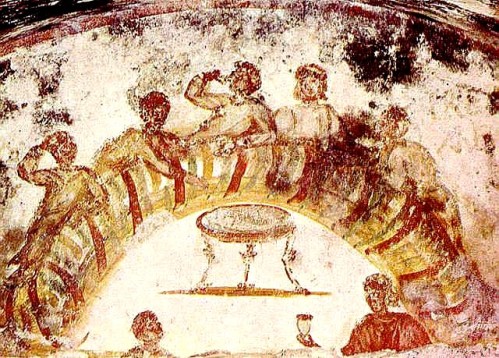Some of us say the communion meal is the most important part of our Sunday assemblies. That’s the whole reason we come together. In fact, some people leave church right after the Lord’s Supper: the crumb, the sip, we’re good, I’m gone! Our actions betray us: We take communion to the hospitals and preside over a lady in a wheelchair breaking a cracker while three men stand by and watch. Our language betrays us: We say we offer the Lord’s Supper on Sunday nights or in our small groups to people “who need it.”
The Lord’s Supper is not a binding duty or a mechanical ritual. It’s not a box to check or a magic pill to swallow. It’s about love and unity and fellowship.
We’ve done everything we can to mess it up. For several centuries now the Church has gone to great lengths to make the meal as private and personal and individual as possible. The joyful communal meal of the early Church has become a crumb of cracker and a sip of juice in quiet, somber, introspective, individual bubbles: “Don’t distract me!” We’ve removed ourselves from the transforming character of the meal.
If the Gospel is that by the death and resurrection of Jesus we can be totally forgiven of our sins and be completely cleansed and pure and can come right into the very presence of God; if the Good News is that we can have a holy and righteous relationship with God and one another; if the Gospel is that we are united with Christ and united with one another in Christ, where do we experience that? How does that become real for us? How do we feel it and know it’s true?
At the table. We experience the Gospel at the table.
Let’s remember our big picture understandings of the communion meal. The Lord’s Supper is eating and drinking a celebration meal with God. Remember, that’s God’s goal. That’s what God is after, it’s what all of salvation history is about: God eating and drinking with us. Because sharing a meal together means there’s relationship. You’ve got things in common. No barriers. There’s acceptance and understanding and trust and friendship around the table. When we’re all dipping our chips into the same bowl of salsa, all the walls are down. There’s community. That’s what God wants with us.
What makes the communion meal a sacrament is that by God’s Holy Spirit, we actually are participating in the reality it represents. We are literally eating with Jesus. Somehow, mysteriously, he meets us at the table and eats with us. All of us.
The table is where we experience what it means to be saved. The oneness, the forgiveness, the community, the relationship, the unity, the acceptance, the fellowship, the common ground. The blood of Christ is what makes us righteous and clean. And the Bible says in 1 Corinthians 10 that when we drink the cup together, we participate in those benefits. Eating the bread together is a communion or a sharing in the unity we have in Christ. We are the body of Christ together. And we experience that around our Lord’s Table.
The people of Israel eat the sacrifices and so receive the benefits of forgiveness and community that’s achieved at the altar. We eat the meal and receive the gifts of forgiveness and community that are achieved at the cross.
By faith, our baptisms make us one people in Christ. No divisions, no differences, no distinctions — we are one body in Christ. And we experience that around the table. The peace, the reconciliation, the community with God and one another.
You want to feel like you really belong? You sit down to a meal with your family.
Peace,
Allan

Leave a Reply